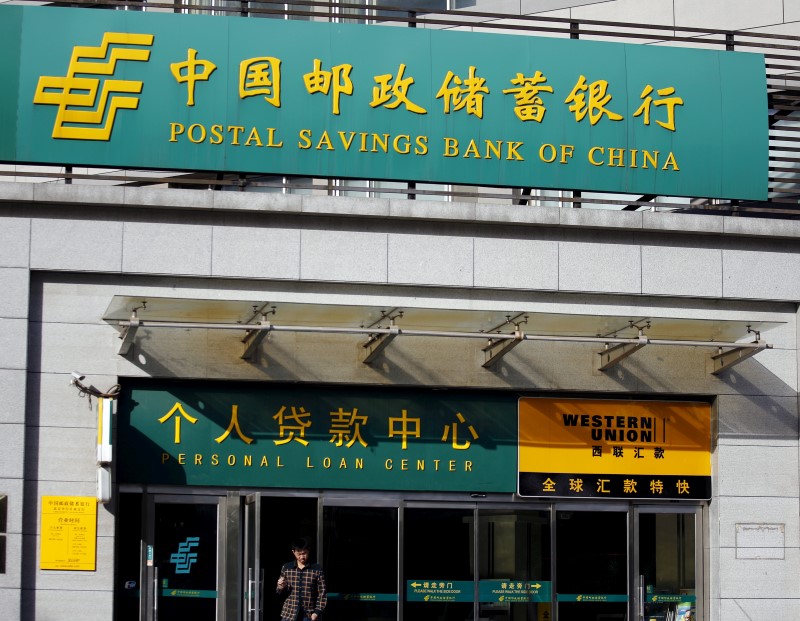By Sumeet Chatterjee and Denny Thomas
HONG KONG (Reuters) - Postal Savings Bank of China, the country's biggest bank branch network, is advertising its strong asset quality to boost its up to $10 billion IPO, but its offer documents also reveal an unsettling and growing exposure to risky shadow loans.
The state-owned bank, which filed a preliminary IPO prospectus last week, has a reassuringly conservative profile, set up as a deposit-taking bank in 2007 on the network of the former postal savings bureau.
Its bad loans at the end of March 2016 were just 0.81 percent in a country where the sector average is officially about 2 percent - and unofficially much worse, say analysts.
But a review of PSBC's 843-page prospectus, issued late on Monday, reveals the bank's growing exposure to illiquid alternative assets that could pose a risk to its balance sheet.
Its investment in high-return assets such as wealth management products (WMP), trust investment plans, asset management plans and securities investment funds have risen to 12.4 percent of total assets at end-March from just 2.7 percent in 2013, the prospectus shows.
Regulators in China are concerned that such "shadow lending" products - often financing borrowers that struggle to raise loans, such as firms with high debts and overcapacity or local government agencies - mask the scale and risks of lending in an economy where debt has ballooned since the global financial crisis.
Such investments typically have more lax provisions for recognizing bad bets than traditional lending and are often structured so as not to appear on the originating bank's balance sheet.
According to analysts, large Chinese commercial banks carry about 5-6 percent of such assets, while mid-sized banks tend to have higher exposure, perhaps 15-30 percent.
PSBC said in the prospectus it was exposed to credit risks arising from these investments as they are not tradable, but it also said the bank had built a "credit risk management structure" covering its entire business process.
"We assign an aggregate credit limit in each financial institution and bond issuer we transact with or invest in. In addition, we set an exposure limit for each customer and make timely adjustments to reflect changes in its risk profile."
PSBC declined to comment beyond the details given in its prospectus.
GROWTH CYCLE
With its more than 40,000 outlets and 505 million customers - about a third of China's population - PSBC is the last big state-backed lender to go public in the world's second-largest economy.
Its access to cheap deposits and a relatively clean loan book have attracted investors including Canadian pension fund CPPIB, global banks JPMorgan (NYSE:JPM) and UBS, and Singapore sovereign wealth fund Temasek Holdings (TEM.UL).
UBS and Temasek declined to comment, while CPPIB and JPMorgan did not immediately respond to requests for comment.
PSBC has also expanded its own WMP offerings in recent years, with proceeds rising to 1.25 trillion yuan ($187.42 billion) last year, more than doubling from 2013, and some of that is in turn invested in these risky alternative assets - a cycle that potentially feeds ever greater growth in these products.
The bank said it was not liable for any loss suffered by investors in its WMPs.
Some investors are also skeptical about the bank's ability to grow after the IPO while keeping its bad loans down in a slowing economy.
"When banks don't have much pressure in growing their assets or loan books its relatively easy for them to control the NPLs," said Edmond Law, a China banking sector analyst with UOB KAY Hian.
"After listing if they are going to expand, if they are going to make more new loans ... that's when the risk comes in."
